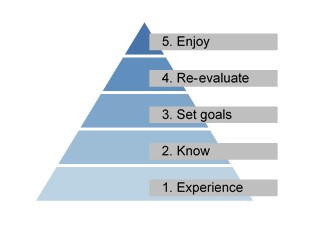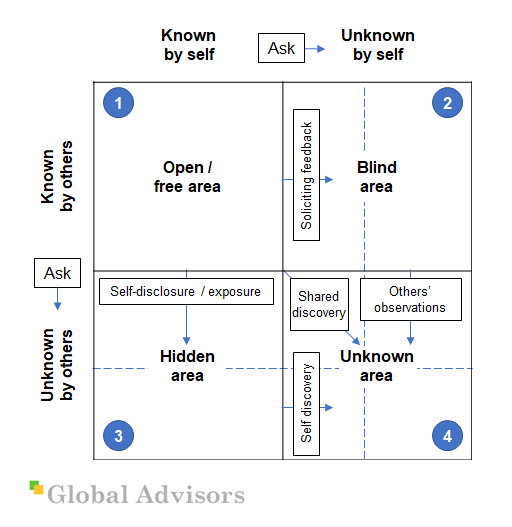By Marc Wilson
Marc is a partner at Global Advisors and based in Johannesburg, South Africa
Picket fences. Family of four. Management position. Mid-life crisis. Meaning. Purpose. Someone once said that, 'At 18, I had all the answers. At 35, I realised I didn't know the question.' Serendipity has a lot going for it. Many people might sail through life taking what comes and enjoying the moment. Others might be open to chance and have nothing go right for them. Some people might strive to achieve, realise rare successes and be bitterly unhappy. Others might be driven and enjoy incredible success and fulfilment. Perhaps the majority of us become beholden to the momentum of our lives. We might study, start a career, marry, buy a dream house, have children, send them to a top school. Those steps make up components of many of our dreams. They are steps that may define each subsequent choice. As I discussed this with a friend recently, he remarked that few of these steps had been subject of deliberations in his life – increasingly these steps were the outcome of momentum. Each will shape every step he takes for the rest of his life. He would not have things any other way, but if he knew what he knows now, he might have been more deliberate about choice and consequence. Doing so might have resulted in greater readiness for the path he is on. There is a balance. Being deliberate and being open to chance are not exclusive. Being on one end of the scale might suppose infinite knowledge and control and on the other, becoming a victim of fate. Being deliberate starts with being conscious. It is not the same as being so tightly wound that there is no time to relax, have fun, or be open to new experiences. It is being conscious of the choices to do those things. Being deliberate does not mean taking every opportunity – it can mean the opposite: turning down opportunities on a carefully considered basis. Being deliberate does not mean driving hard at every intended goal. Driving hard can drive people and opportunities away. Sometimes stepping back can allow others to step forward. Being deliberate also does not mean never giving up. On the contrary, being deliberate requires regular re-evaluation and perhaps giving up on something that does not accomplish your goals, get the best out of you or make you as happy as you might be. As a leader, being deliberate does not mean being authoritarian – it typically means getting the best out of others, requiring facilitation, coaching and providing space. Clearly, being deliberate requires intricate balance. I believe the following five steps are the elements of leading a deliberate life:
Step 1: Experience
We are influenced, shielded, moulded and directed from birth. For some – very few – upbringing, friends and circumstance might encourage being open to anything. For the vast majority of us, it does the opposite. We are programmed about what not to be, what not to do, how to look, how to behave. We are told what is acceptable. Some rebel. Most conform to a closeted societal norm. Being deliberate is knowing who you are, what you want and driving progress to get there. The basis of knowing who you are and what you want is to experience life deliberately. We cannot know whether we will like a food if we do not taste it. Yet we might look at some foreign dish with disgust and declare our distaste. Life is like a tasting board. Sometimes we need to put on a blindfold and be open to new flavours. It is not optimal to treat every meal as a tasting occasion, but without being deliberate about creating the space, time and mindset to experience new things, we may miss out on the best available to us. However, some people live in fear of missing out – driving to new experiences, fearing the commitment of being tied down, looking for the next ever greater high. Being deliberate requires turning down experiences too. Thankfully most experiences in life do not have such dramatic trade-offs – merely the need to challenge ourselves. Shutting off new experiences too early can lead us to lead a less fulfilling life. Step 2: Know and be true to yourself
Together with being open to experiences, we need to develop the openness to who we might be. Most of us might live in fear of disapproval or fear of the unknown. We all have fears of what we might be. Some of these are real and justified – we may not want to be arrogant, abusive, etc. However, not knowing who we are is merely denial. We are then unable to live our best lives. Most people do not really know themselves. Our shadow selves and blind spots steer us without our knowledge or hijack us without our realising their role. In their most brutal form, they drive a mid-life crisis, insecurity and unhappiness. They can also protect us and they make us the unique people we are. Without experience, we are unable to discover our unknown selves (see the Johari inset or Jung's shadow self) and without the feedback from interacting with others, we are unable to understand our blind spots. Knowing ourselves helps us understand what the true reasons are for our happiness and unhappiness, for our functional and dysfunctional behaviour. It is in the patterns of our happiness and unhappiness and the triggers for our functional and dysfunctional behaviour that our true self hides. Knowing ourselves also empowers us to ensure we are not living for someone else, on someone else's terms. Life is about compromise in moments, not as a whole. When we are making decisions based on our experiences and knowledge of ourselves, we need to be fully aware of the consequences. Where we lack experience and complete knowledge, we need to manage the risk of those consequences not matching our later experience and knowledge. ? Step 3: Set goals and timeframes
Life goals might be varied. They have precedence and priority. They vary by person. They should be driven by the knowledge of who we are. Fundamentally we must understand why a goal is important to us and why achieving it will fulfil us. When we are young, we might confuse outcomes with goals. Becoming a CEO, marrying, having children, being wealthy, having a beautiful home – outcomes are the results of successfully achieving the real goals – doing valuable work, meeting someone we love and who loves us, being appropriately appreciated and rewarded. We confuse precedence – we might want to run a marathon within a certain time before achieving training goals, we may desire marriage before achieving the goal of meeting the right person, we might desire promotion before proving our competence and value. We often set goals without gaining experience and knowing ourselves. When we do this, is it any wonder that when we achieve our goals we might feeling the gnawing sadness of being unfulfilled? Step 4: Re-evaluateMomentum is powerful. We embark on a path and merely because of our past effort and experience, shut down opportunities to be on a better path and live a better and happier life. We fear re-evaluation because it requires the wisdom of Solomon – sometimes we must give up on what we have to gain new experiences, be truer to the increasing knowledge of ourselves – and to be happier. We also require the wisdom to not unnecessarily discard what we have for a perhaps. But most choices are not this dire. Re-evaluation can mean adjusting a path on the way to a goal. And where adjustments are large, acknowledging that we are not fulfilled by something gives us a 100% of the rest of our lives to step towards what makes us happy. However late in our lives that is, it's still 100%. Step 5: Enjoy the journeyBeing goal-driven is admirable and deliberate. But being deliberate is also about being conscious of the journey. We can deliberately stop the car to enjoy the view, take time to relax, to be with friends, to celebrate a work success with colleagues, to mourn, to empathise – to be human. We can acknowledge when we don't know and be excited by discovery. Psychologists are increasingly finding that the pursuit of happiness holds false promise. Rather, it is the acknowledgement and mindfulness of all of our life – including sadness, anger, unhappiness and the reasons for those – that leads to fulfilment and happiness. |
Sign up to our email newsletters and receive Thoughts newsletters and others to your inbox! Ensure you don't miss an update: go to http://www.globaladvisors.biz/newsletters to sign up.



